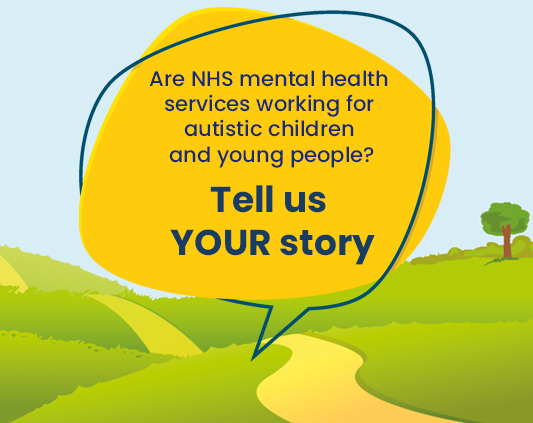Are NHS mental health services working for autistic children and young people?
We have been hearing from local families that some NHS mental health services aren’t working for them. To understand what is happening, we would like to hear about the experiences of as many autistic children and young people as we can. This includes children with a formal autism diagnosis, currently being assessed, or where there is an indication of autism. We want to know what is working well and what could be better.
Please tell us about your family’s experiences online, or by getting in touch in a way that suits you.
What you tell us will be included in a report to those who pay for and provide these services, along with recommendations of how services could be improved for children and young people. It will be anonymous and we will ensure you cannot be identified.
Read what Sarah, Ellie and Jennifer have to say and then tell us your story…
Parent Sarah says “For both of my children it took several years to get a diagnosis of ADHD and autism. Both have had issues with their mental health alongside their ADHD and autism. The delay in diagnosis impacted negatively on their mental health and both also experienced additional deterioration after Covid-19.
“Many different health and care services have been involved with my children, but these services are unfortunately not all joined up. Often referrals would be accepted for support but then discharged on the basis that other services were already involved or were better suited to provide support, care or treatment. When support has been received this is time-limited or specific to concerns at any one time leading to the process of needing to fight to seek help again later down the line.
“My children’s mental health difficulties have been seen as being ‘part of their autism’ rather than a separate condition that required treatment and help. This has led to difficulties and challenges getting the right support and most appropriate services involved for their mental health. Many people on the autistic spectrum have anxiety and mental health issues. This is not autism but the effect of having to adjust to the world around them and the many challenging situations they face.
“What has been most difficult is that every step of the way I have had to fight to get the right support my children need, challenging what we have previously been told and doing a lot of research ourselves. At times we felt we were not being listened to. It feels like we have had to become specialists in our own right, whilst also caring for children with additional needs that can be very challenging.”
Young person Ellie told us “The mental health professional I saw at the NHS didn’t seem to know very much about autism, so they didn’t realise that the appointments themselves were very stressful for me. I don’t think they always believed me when I said how bad I was feeling because on the surface I appeared to be okay.
“My mental distress at the time was extremely high and I was experiencing some very dark thoughts, but I didn’t feel listened to or understood. I would have liked to have had someone like my dad with me at the appointments but that wasn’t an option because they were held at school.
“My mental health has slowly improved since then but that’s because I started seeing someone privately who has experience of working with autistic people. I feel very lucky about this because I know not everyone would be able to afford it.”
Jennifer, whose child is autistic, says “The initial relief of my child being provided mental health support was quickly replaced by concern, as instead of getting better they got worse. A lack of knowledge and understanding about autistic presentation meant the therapist didn’t connect authentically with my child, who in turn felt invalidated by the whole experience.
“The number of sessions offered was limited and at the end of the programme I was shocked to find my child didn’t reach the threshold for further support. Instead, we were provided with a list of community-based support organisations and left to fend for ourselves. As a parent I now have a complete lack of confidence and trust in the NHS mental health system.”
Tell us YOUR story
Whether your child may be autistic, is currently being assessed or has a formal autism diagnosis, we’d like to hear their experiences of mental health services. We’d like to know what went well and what could have been better. Tell us your story online, or if you’d prefer to speak to one of our friendly team in confidence, please get in touch.
This piece of work has now closed.




